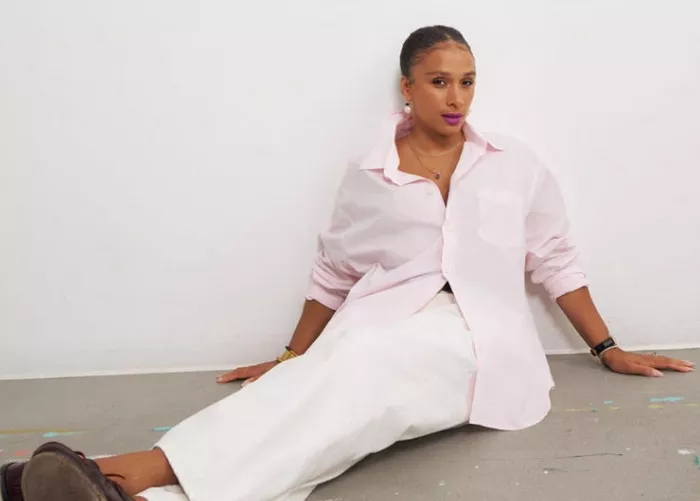Few menswear brands have achieved the cult status that Noah enjoys. While the clothing—fusing classic preppy style with ’90s surf and skate culture—is a significant reason for this, the brand offers more than just fashion. Known for relaxed hoodies, graphic tees, navy sport coats, sturdy chinos, and madras jackets, Noah is also recognized for its commitment to sustainable and thoughtful production. Collaborations with iconic names like Barbour, Timex, and even goth rock band The Cure have further elevated the brand’s reputation.
But Noah’s appeal goes beyond the garments. Buying from Noah means joining a community, immersing yourself in a unique cultural world carefully built by its cofounder, Estelle Bailey-Babenzien.
Bailey-Babenzien plays a central role in shaping Noah’s identity by designing the interior of each store. Alongside her husband and cofounder Brendon Babenzien—former Supreme veteran and current men’s creative director at J.Crew—she helped relaunch Noah in 2015. Their stores across Asia and in New York act as reflections of their shared vision of American fashion and culture. Inside, clothing exists in harmony with curated objects: music, books, emerging art, and recycled rugs that mirror Noah’s values of environmental responsibility and craftsmanship.
When we spoke with Bailey-Babenzien in March, she was preparing for the opening of 199 Mulberry, an extension of the New York flagship in SoHo. Described as the most complete expression of her design ethos so far, this space blends fashion with culture—offering rare books, vintage watches, records, and art alongside high-end clothing. “I like to think of it as an oversized salon with a few treasures to discover,” she explains.
Later this year, Noah plans to open a new location in Los Angeles, further expanding its physical footprint. In an era dominated by e-commerce, Bailey-Babenzien sees physical stores as central to the brand’s philosophy. For her, stores should be welcoming spaces where people don’t just shop, but also connect.
“These are stores that people could hang out in,” she says, “and they’ll not just be talking about the clothes but what you do in the clothes, which is more important.”
Her focus on community and atmosphere is deeply rooted in her eclectic background. A graduate of London’s Central Saint Martins, Bailey-Babenzien explored careers in fashion, music, and interior design before settling into her current role. She found traditional fashion circles too elitist and the music industry too narrow in its inclusivity. With Noah, she created a space where all her interests—design, fashion, art, and social engagement—could coexist.
In the 2010s, Bailey-Babenzien was a trailblazer in what’s now known as the “living room storefront” concept. Noah’s SoHo location combines influences from Brendon’s Long Island roots, her English upbringing, her Ghanaian heritage, and the craftsmanship of local artisans. The result is a warm, light-filled, inviting atmosphere that feels more like a stylish apartment than a typical retail store. It’s where Lower Manhattan’s fashion insiders gather for oat-milk lattes, conversation, and culture—even when they’re not shopping.
“The idea is like, yes, come here. Sure, you can get some nice clothes, learn about the fabrics, whatever. But hang out,” Bailey-Babenzien says. “What else are we talking about? What’s going on in the world? What are you doing? Are you into writing, reading, skateboarding? What is it that kind of makes you tick? So we try to create these environments that foster that and also might provoke conversations.”
And those conversations are open to everyone—not just fashion influencers. Unlike many exclusive lifestyle brands, Noah thrives on inclusivity. Bailey-Babenzien recalls a recent moment when a family of six visited a Noah store. Each member found something meaningful, from the child to the grandmother, who fell in love with a pair of pants.
“I was like, ‘This is exactly it,’” she says. “It can span generations.”
For Estelle Bailey-Babenzien, Noah isn’t just a fashion label—it’s a platform for cultural dialogue, personal expression, and inclusive community building. And in a time when retail spaces are shrinking, she’s proving that there’s still power in creating a place where people truly feel at home.
Related Topics
- Marks & Spencer Unveils Effortless Elegance at Delhi Times Fashion Week with Summer 2025 Collection
- Buluuy Mirrii Shines Bright at Australian Fashion Week with ‘Women’s Business’ Collection
- Indian E-Commerce Giants Myntra and Ajio Halt Turkish Brand Sales Amid Rising National Sentiment

